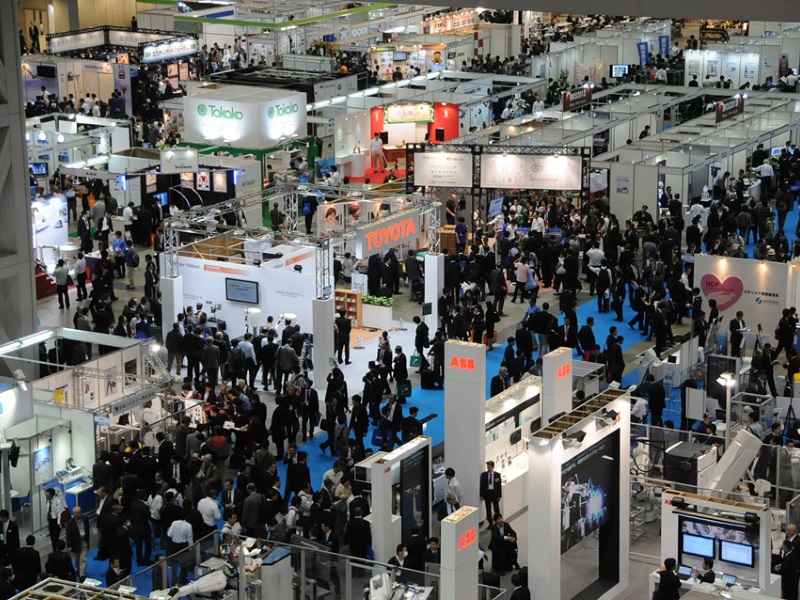- Home
- Science
- Science News
- Japan Shows Off Disaster Response Robots at Android Fair
Japan Shows Off Disaster-Response Robots at Android Fair

Japan on Wednesday displayed a pair of two-legged humanoid robots that can operate in harsh conditions as the country prone to earthquakes and volcanic eruptions prepares for the next catastrophe.
Simulating work in a tunnel after a quake, two slender robots with tiny heads attached with sensors walked through fake debris to extinguish a fire during a demonstration at the International Robot Exhibition in Tokyo.
The four-day event which kicked off Wednesday, is held once every two years in Japan's capital.
This year it is drawing nearly 450 participating organisations - the biggest since it started about four decades ago. Some 57 of the groups come from countries including France, Britain, Russia and South Korea.
This year's show is focused on robotic equipment for disaster relief, assisting the elderly as well as their caregivers, and for farming.
Disasters are a fact of life for Japan, an archipelago nation facing the "Ring of Fire" - the rim of the Pacific Ocean that includes other earthquake and volcanic zones from Chile all the way around to New Zealand.
The two disaster-relief droids were developed in a project under the New Energy and Industrial Development (NEDO) - a national research organisation - that started after a devastating earthquake and tsunami hit northern Japan in 2011.
But unlike in Hollywood movies where bots can run, jump and fly at high-speeds, these droids are the slow and steady type.
HRP-2 Kai and red-and-yellow coloured JAXON - named after the late singer Michael Jackson - were on Wednesday focused on more serious tasks.
"HRP-2 Kai is now recognising debris and thinking with a sensor on its head about where to put its foot," said Fumio Kanehiro, researcher at the National Institute of Advanced Industrial Science and Technology that developed the robot.
'Wonderful robots'
While HRP-2 Kai, which is 170 cm (5-feet 6-inches), walked on a narrow board, 188 cm-tall JAXON - developed by the University of Tokyo moved forward by bending its back and putting both hands on the floor, judging that the ceiling was too low to move upright.
It then lifted itself up to remove a box and debris to secure a pathway tasks that could be done even in a risky environment hazardous to humans.
But humanoid bots are far from perfect, suffering from balance problems on rough terrain, conceded Shuji Yumitori, head of NEDO's robot division.
He added that his organisation hopes further improvements will put them in commercial use in as little as five years.
"They'll be wonderful robots," Yumitori said.
Still Japan, where robots have been developed for decades, does not always excel in global competitions.
In June, Japanese-made robots made it to the finals of a US disaster-response contest inspired by the 2011 meltdowns at the Fukushima nuclear plant that followed the earthquake and tsunami.
JAXON's performance at the event - eventually won by South Korean scientists - proved to be cringe-inducing as the droid tumbled and had to be carried away on a stretcher.
Yumitori, however, shrugged off the defeat.
"Our priority is not about whether we win or not," he said.
"It's about whether we can create something that is useful for human beings."
Catch the latest from the Consumer Electronics Show on Gadgets 360, at our CES 2026 hub.
- Samsung Galaxy Unpacked 2025
- ChatGPT
- Redmi Note 14 Pro+
- iPhone 16
- Apple Vision Pro
- Oneplus 12
- OnePlus Nord CE 3 Lite 5G
- iPhone 13
- Xiaomi 14 Pro
- Oppo Find N3
- Tecno Spark Go (2023)
- Realme V30
- Best Phones Under 25000
- Samsung Galaxy S24 Series
- Cryptocurrency
- iQoo 12
- Samsung Galaxy S24 Ultra
- Giottus
- Samsung Galaxy Z Flip 5
- Apple 'Scary Fast'
- Housefull 5
- GoPro Hero 12 Black Review
- Invincible Season 2
- JioGlass
- HD Ready TV
- Laptop Under 50000
- Smartwatch Under 10000
- Latest Mobile Phones
- Compare Phones
- Honor Magic 8 RSR Porsche Design
- Honor Magic 8 Pro Air
- Infinix Note Edge
- Lava Blaze Duo 3
- Tecno Spark Go 3
- iQOO Z11 Turbo
- OPPO A6c
- Samsung Galaxy A07 5G
- Lenovo Yoga Slim 7x (2025)
- Lenovo Yoga Slim 7a
- Lenovo Idea Tab Plus
- Realme Pad 3
- Moto Watch
- Garmin Quatix 8 Pro
- Haier H5E Series
- Acerpure Nitro Z Series 100-inch QLED TV
- Asus ROG Ally
- Nintendo Switch Lite
- Haier 1.6 Ton 5 Star Inverter Split AC (HSU19G-MZAID5BN-INV)
- Haier 1.6 Ton 5 Star Inverter Split AC (HSU19G-MZAIM5BN-INV)


![[Sponsored] Haier C90 OLED TV | Dolby Vision IQ, 144Hz OLED and Google TV in Action](https://www.gadgets360.com/static/mobile/images/spacer.png)









